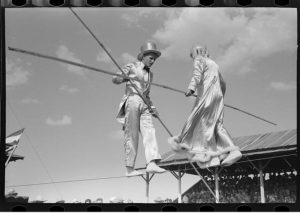Washington, in the last number of weeks, is being haunted. It’s a resurrection, a ghost echoing down the halls of congress. Some say the phantom has even been spotted outside of the White House. Tall, lanky, with a Texas-hill country drawl and a Stetson hat, some have seen the apparition urinate in the rose garden, curse a lot, and make threats. The ghost is nothing, if not tenacious.
If the ghost of Lyndon B. Johnson has not yet been spotted, I can only hope that the sightings become more and more frequent. LBJ reminds us that sometimes gentility has its limits. Sometimes, you have to push privately and publicly for those issues you are committed to. Sometimes, you simply have to stand your ground and get people on your side in every possible way. The ghost of LBJ can show today’s leaders in Washington that they have to keep their eyes fixed on their goals.
LBJ knew how to create coalitions, bargain, and ultimately get things done. He wasn’t a fan of sweeping oratory and big plans. Instead, he moved his agendas forward by masterly mapping out the political terrain, clearly communicating his message, and locating allies and resistors.
LBJ’s political skill was executed wonderfully in 1957 when he pushed through the country’s first Civil Rights Act in 82 years. At the time LBJ was the Majority Leader of the Senate and had to work overtime to pass the civil rights bill in a politically tense and divided atmosphere. Conservative southerners didn’t want to see the bill pass because they felt that it would step on states’ rights and liberal Democrats didn’t want to make compromises on a bill that wasn’t progressive enough.
Ultimately, the Civil Rights Bill of 1957 passed because LBJ, through cajoling, threats, and coalition building, was able to get southern and Democratic coalitions to make compromises. Although LBJ had to limit the impact of the Civil Rights Bill of 1957 he opened the door for continued reform.
If LBJ’s ghost can still be still be seen in Washington it’s hopefully angrily grabbing the lapels of some leaders and cozying up to others in order to get agendas moving forward. LBJ taught us that leadership wasn’t a staged spectacle, but rather a proactive exercise that required time consuming coalition building, constant attention, bargaining, and planning. As Johnson himself said, “There are no problems we cannot solve together, and very few that we can solve by ourselves.”



